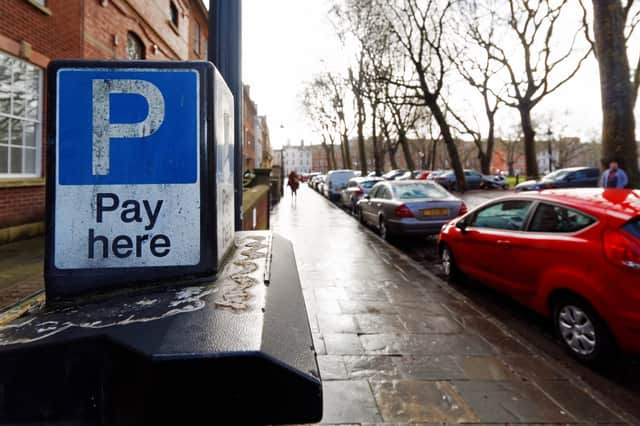Bristol firms face £400-a-year levy for every employee parking at work under a Green Party plan


Businesses could be charged about £400 a year for every employee who parks their car at work under a Green Party motion to Bristol City Council.
The main opposition group is calling for a workplace parking levy which it says could raise more than £12million annually to spend on public transport.
Advertisement
Hide AdAdvertisement
Hide AdA similar scheme has been running in Nottingham for a decade and exempts small firms with fewer than 11 spaces, NHS staff, electric vehicles and disabled badge holders.
The “golden” motion tabled by Bristol’s Greens to a meeting of full council on Tuesday evening (November 9), which is guaranteed to be debated, says these and other exceptions could be introduced in the city.
It says Nottingham collects £9million per year from the charges, roughly £400 for each private company staff space, and has used the money to double the size of its tram network and fund other sustainable transport.
A Bristol City Council budget amendment by the Greens in February 2020 secured £30,000 for an appraisal report for the scheme but has not yet been produced.
Advertisement
Hide AdAdvertisement
Hide AdThis week’s motion, proposed by Lockleaze Cllr David Wilcox, calls on the Labour administration to publish it and commit to establishing a workplace parking levy, also called a corporate parking levy, if its conclusions are positive, along with a timetable to have it up and running by April 2024.
Cllr Wilcox said the scheme would cut commuting traffic and air pollution.
“It could provide over £12 million each year for Bristol to invest in upgrading our public transport and active travel,” he said.
“This could unlock a huge range of benefits for our city – a network of safe, joined-up bike lanes, cheaper and more frequent buses, in the longer term even funding to develop projects like a tram network.”
Advertisement
Hide AdAdvertisement
Hide AdCllr Wilcox said it would require consultation and include a range of exemptions to limit any harmful impact.
“The levy would charge employers for having parking spaces. However, employers with less than 11 spaces – many of Bristol’s small businesses – could be exempt, as could spaces dedicated to electric vehicle charging and those for disabled employees,” he said.
“Spaces used for visitor parking and deliveries would also be left out of the scheme.
“Nottingham has a range of exemptions like these, including one for NHS workers, and Bristol would be able to go further if needed to ensure we protect lower-paid workers.
Advertisement
Hide AdAdvertisement
Hide Ad“It’s not right some people feel forced to drive to work to get in on time – we have a duty to improve our public transport in this city, so people have a real alternative to the car. This is precisely what the parking levy would do.”
Ashley Green Cllr Tim Wye, who is seconding the motion, said: “Bristol’s transport system isn’t working for anybody – before the pandemic, the average rush-hour driver in Bristol spent over six days each year waiting in traffic.
“This congestion delays our buses, generates air pollution contributing to hundreds of deaths in our city each year and emits greenhouse gases.
“Time is critical – we’re already seeing traffic returning to pre-pandemic levels according to some data.
Advertisement
Hide AdAdvertisement
Hide Ad“It’s great that a Clean Air Zone will finally be coming next year, after years of delays, but on its own a CAZ won’t revolutionise our transport or reduce much traffic, it is just one of a raft of measures needed that work together to tackle our problems with air pollution and traffic.
“We need to start working on this as soon as possible to prevent Bristol turning back the clock to traffic chaos and pollution and unlock the transport upgrades our city needs – I hope the other parties will support it.”
Comment Guidelines
National World encourages reader discussion on our stories. User feedback, insights and back-and-forth exchanges add a rich layer of context to reporting. Please review our Community Guidelines before commenting.